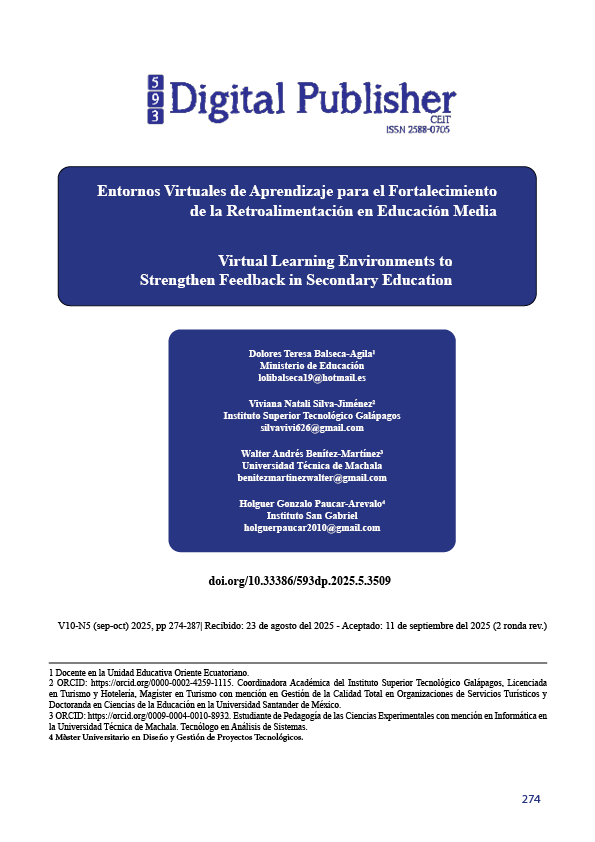Virtual Learning Environments to Strengthen Feedback in Secondary Education
Main Article Content
Abstract
Virtual learning environments have been consolidated as key spaces to promote interaction, personalization, and feedback in education. The present study aimed to analyze the impact of a virtual environment on strengthening feedback and the development of historical competences in high school students. The research was developed under a Design-Based Research (DBR) approach, complemented with a quasi-experimental design. Sixty students participated, distributed into an experimental group (n=30) and a control group (n=30), over a period of eight weeks. The intervention, implemented on the Moodle platform and supported with resources designed in Canva and Google Forms, included processes of formative, continuous, and personalized feedback. The results showed significant improvements in the experimental group: a 25% increase in academic performance, a 29% increase in historical understanding, and an 18% increase in active participation. In addition, 85% of the students positively valued the clarity of the resources, and 78% the usefulness of the digital tools. These findings suggest that contextualized and timely digital feedback not only improves performance but also fosters motivation and autonomy in learning. It is concluded that virtual environments designed with a pedagogical approach centered on feedback constitute an innovative, replicable, and adaptable model for other educational contexts. Likewise, they contribute to transforming the teaching of History and consolidating a culture of formative assessment in Latin American high school education.
Downloads
Article Details

This work is licensed under a Creative Commons Attribution-NonCommercial-ShareAlike 4.0 International License.
1. Derechos de autor
Las obras que se publican en 593 Digital Publisher CEIT están sujetas a los siguientes términos:
1.1. 593 Digital Publisher CEIT, conserva los derechos patrimoniales (copyright) de las obras publicadas, favorece y permite la reutilización de las mismas bajo la licencia Licencia Creative Commons 4.0 de Reconocimiento-NoComercial-CompartirIgual 4.0, por lo cual se pueden copiar, usar, difundir, transmitir y exponer públicamente, siempre que:
1.1.a. Se cite la autoría y fuente original de su publicación (revista, editorial, URL).
1.1.b. No se usen para fines comerciales u onerosos.
1.1.c. Se mencione la existencia y especificaciones de esta licencia de uso.
References
Andrade, J., & Gómez, V. (2024). Prácticas de retroalimentación docente en entornos virtuales en América Latina: Retos y oportunidades. Educación y Humanismo, 26(48), 1–14. https://doi.org/10.17081/eduhum.26.48.5623
Coaguila Mayanaza, D. V., Infanción Morales, M. M., Chalco Cano, A. G., & Torres Calderón, J. (2025). Los entornos virtuales para potenciar el aprendizaje colaborativo en estudiantes universitarios. Zenodo. https://doi.org/10.5281/zenodo.14976725
Grace Mariuxi, L. V., Aranda Morales, S. S., Peralta Concha, C. M., Tejero Cabeza, R. P., Chalá Álvarez, B. E., & Pacheco Rodríguez, A. R. (2025). Innovación educativa a través de tecnologías multimedia: Fortalecimiento de la comprensión lectora en educación básica: Educational innovation through multimedia technologies: Strengthening reading comprehension in basic education. Revista Científica Multidisciplinar Generando, 6(1). https://doi.org/10.60100/rcmg.v6i1.441
Guisasola, J. (2024). La investigación basada en el diseño: Algunos desafíos y perspectivas. Revista Eureka sobre Enseñanza y Divulgación de las Ciencias, 21(2), 2801. https://doi.org/10.25267/Rev_Eureka_ensen_divulg_cienc.2024.v21.i2.2801
Hattie, J., & Timperley, H. (2023). The power of feedback revisited. Review of Educational Research, 93(1), 7–36. https://doi.org/10.3102/00346543221122667
Heitink, M., Voogt, J., & Fisser, P. (2022). Feedback in technology-enhanced learning environments: A systematic review. Educational Technology Research and Development, 70(1), 23–44. https://doi.org/10.1007/s11423-021-10045-y
López, M., & Ramírez, P. (2023). Evaluación formativa y feedback digital en educación básica: Un estudio en escuelas públicas. Revista Electrónica Educare, 27(3), 1–20. https://doi.org/10.15359/ree.27-3.15
Merellano Navarro, E., Almonacid-Fierro, A., Bravo Basualto, D., Correa Pérez, F., Medina Rojas, G., & Valenzuela Beltrán, L. (2025). Uso del juego como recurso didáctico en los procesos de enseñanza y aprendizaje: Percepción de profesores del sistema escolar. E-balonmano.com Journal Sports Science, 21(1), 77–90. https://doi.org/10.17398/1885-7019.21.77
Nicol, D., & Macfarlane-Dick, D. (2023). Formative assessment and self-regulated learning: A model and seven principles of good feedback practice. Assessment & Evaluation in Higher Education, 48(2), 215–229. https://doi.org/10.1080/02602938.2022.2071526
Panadero, E., & Lipnevich, A. A. (2022). A review of feedback models in education: State of the art and future research. Educational Psychologist, 57(3), 177–196. https://doi.org/10.1080/00461520.2022.2074096
Salamanca Villate, A., Calvo Sevillano, G., Satrústegui Moreno, A., & Martínez-Aznar, J. (2024). Investigación basada en el diseño: Secuencia didáctica sobre gestión de residuos en la formación de profesorado. Didáctica de las Ciencias Experimentales y Sociales, 46, 123–138. https://doi.org/10.7203/dces.46.27416
Salido-López, P. V. (2025). Aprendizaje basado en proyectos artísticos (ABP-A) y diseño universal para el aprendizaje (DUA): Evaluación cualitativa de un programa de intervención pedagógica en la formación inicial de docentes. Revista de Investigación Educativa, 43(1). https://doi.org/10.6018/rie.565501
Salinas, J., & Cárdenas, R. (2023). Retroalimentación digital como estrategia de aprendizaje en entornos virtuales universitarios en América Latina. Revista Iberoamericana de Educación a Distancia, 26(2), 45–64. https://doi.org/10.5944/ried.26.2.35288
Villavicencio, M., & Luján, D. (2024). Entornos virtuales y retroalimentación formativa en la enseñanza de Historia en secundaria: Experiencias en contextos latinoamericanos. Revista Latinoamericana de Tecnología Educativa, 23(1), 115–134. https://doi.org/10.17398/1695-288X.23.1.115
Burcin Hamutoglu, N., Gemikonakli, O., Savasci, M., & Gultekin, G. S. (2018). Development of a scale to evaluate virtual learning environment satisfaction. International Journal of Assessment Tools in Education, 5(2), 201–222. https://doi.org/10.21449/ijate.345150
Chávez Vera, S. V., & Vaca-Cárdenas, M. E. (2025). Entornos virtuales en el proceso de enseñanza-aprendizaje de las Ciencias Naturales del nivel de Educación Básica Media. Revista Cognosis, 9(EE2). https://doi.org/10.33936/cognosis.v9iEE2.6942
Domingo, J. R., & Bradley, E. G. (2018). Education student perceptions of virtual reality as a learning tool. Teaching in Higher Education. https://doi.org/10.1177/0047239517736873
Galecio Mora, D. E., Carazas Durand, C. R., & Flores Cueva, M. Y. (2025). Entornos virtuales para el aprendizaje: una revisión sistemática. Revista InveCom. https://doi.org/10.5281/zenodo.15447967
Guerrero, F. (2023). Importancia de los entornos virtuales en el desarrollo de la educación virtual. Caminos de Investigación, 4(2), 13–27. https://doi.org/10.59773/ci.v4i2.62
Hamutoglu, N. B., Gemikonakli, O., Savasci, M., & Gultekin, G. S. (2018). Development of a scale to evaluate virtual learning environment satisfaction. International Journal of Assessment Tools in Education, 5(2), 201–222. https://doi.org/10.21449/ijate.345150
Oliveira, J. de, Gallardo Echenique, E., Bettencourt, T., & Gisbert Cervera, M. (2022). Meandros de la interacción: desafíos del uso pedagógico de los entornos virtuales 3D. Revista Iberoamericana de Educación. https://doi.org/10.35362/rie600450
Salcedo, F., Lucio, A., Ribadeneira, E., Valencia, G., & Barragán, R. (2025). Entornos virtuales de aprendizaje en la intervención educativa de estudiantes del Departamento de Información y Comunicación, Universidad Estatal de Bolívar. Revista de Investigación Enlace Universitario.
Tirado-Olivares, S., Cózar-Gutiérrez, R., González-Calero, J. A., & Dorotea, N. (2024). Evaluating the impact of learning management systems in geographical education in primary school: An experimental study on the importance of learning analytics-based feedback. Sustainability, 16(7), Article 2616. https://doi.org/10.3390/su16072616
Tuero, E., Álvarez-Blanco, L., Ayala-Galavis, I. C., Galve-González, C., & Bernardo, A. B. (2023). Do virtual campuses provide quality education? A study on the perception of higher education. Sustainability, 15(1), Article 620. https://doi.org/10.3390/su15010620
Vuorio, J. (2024). Studying the use of virtual reality learning environments to engage school children in safe cycling education. International Journal of Instructional Technology and Educational Studies. https://doi.org/10.1177/10468781241246566
Villacis Lizano, M., Moreno Genovés, M., & Benavides Lara, R. (2021). Entornos virtuales como espacios de enseñanza-aprendizaje: “Un enfoque teórico para la educación superior”. Horizontes, 5(19). https://doi.org/10.33996/revistahorizontes.v5i19.230
Zhang, S., & Hasim, Z. (2025). Enhancing English language teaching and user experience in virtual environments: A systematic review on gamification and personalised learning. Journal of Language and Education, 11(2), 157–174. https://doi.org/10.17323/jle.2025.24798





